UL 1973 Battery Integration Testing with Inverters
The UL 1973 standard provides a comprehensive framework for testing the integration of batteries into inverters, ensuring safe and reliable operation in renewable energy systems. This service is essential for manufacturers and suppliers looking to ensure their products meet stringent safety requirements set by Underwriters Laboratories (UL).
Battery integration with inverters plays a crucial role in the efficiency and reliability of photovoltaic (PV) systems. The UL 1973 standard addresses the specific challenges associated with integrating batteries into inverter systems, which are designed to convert DC power from solar panels or energy storage systems into AC power suitable for household or industrial use.
The testing process involves evaluating various aspects such as the electrical characteristics of the battery, its interaction with the inverter, and the overall system stability. This ensures that the integration does not compromise safety or performance under any conditions. The UL 1973 standard is widely recognized and accepted globally, providing a benchmark for quality and reliability.
Manufacturers and suppliers must adhere to this standard to ensure their products are safe and compliant with international regulations. By partnering with our laboratory, you can benefit from our expertise in conducting rigorous tests that meet or exceed the requirements set forth by UL 1973. This service is particularly important for companies operating in sectors such as renewable energy, where safety and performance are paramount.
The testing process typically involves several key steps, including:
- Initial system setup and configuration
- Detailed electrical characterization of the battery
- Evaluation of the interaction between the battery and inverter
- System stability and performance testing under various conditions
- Compliance checks against UL 1973 specifications
Our laboratory utilizes state-of-the-art equipment to ensure accurate and reliable test results. Our team of experts is well-versed in the intricacies of the UL 1973 standard, ensuring that your products receive thorough testing and certification.
Beyond compliance, this service offers several benefits to manufacturers and suppliers:
- Enhanced product safety and reliability
- Increased market confidence through UL-certified products
- Competitive advantage in a demanding global market
- Potential for regulatory approval and easier market entry
- Improved reputation among stakeholders, including end-users and partners
In addition to the above benefits, adhering to the UL 1973 standard can help companies meet the growing demand for sustainable energy solutions. As more countries adopt renewable energy policies, ensuring compliance with international standards like UL 1973 is becoming increasingly important.
The UL 1973 standard applies specifically to the integration of batteries into inverters in PV systems. This includes testing the battery's ability to interface with the inverter and ensure safe operation under various conditions. The standard covers a wide range of tests, including electrical performance, thermal management, and safety features.
Our laboratory offers comprehensive services to support your compliance needs:
- Initial consultation on test requirements
- Detailed testing according to UL 1973 standards
- Comprehensive reporting and certification
- Ongoing support for any additional testing or modifications
By leveraging our expertise in this area, you can ensure that your products meet the highest safety and performance standards. Our commitment to quality and reliability is unmatched, providing peace of mind for both manufacturers and suppliers.
In conclusion, UL 1973 battery integration testing with inverters is a critical service for companies operating in the renewable energy sector. By partnering with our laboratory, you can ensure that your products meet the stringent requirements set forth by this standard, enhancing product safety and reliability while gaining a competitive edge in the global market.





